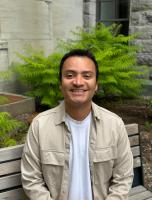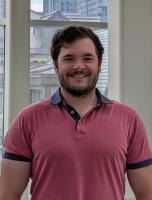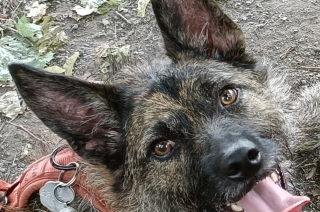Guillaume Durandau
Principal Investigator, Director NeuRoC Lab
Assistant Professor, Department of Mechanical Engineering, McGill University
Researcher, Jewish Rehabilitation Hospital, Centre for Interdisciplinary Research in Rehabilitation of Greater Montreal (CRIR)
Google Scholar McGill Website CRIR Website guillaume.durandau [at] mcgill.ca (Email)

Research Assistants

Thiago Vidal Pereira
Research Assistant (2025-Present) in co-supervision with Prof. Joyce Fung
Research area: Rehabilitation, Biomechanics, Markerless Motion Capture, Implementation
Details
Thiago Vidal Pereira is a recent graduate in Rehabilitation Science at McGill University. With a background in physiotherapy and biomechanics, Thiago is passionate about connecting innovative technologies with person-centered rehabilitation practices. At the NeuRoC Lab, he explores how markerless motion capture can be implemented in rehabilitation settings across the lifespan. Outside the lab, he enjoys spending time in Montreal’s parks, reading, playing board games, and gathering with friends.
thiago.pereira [at] mail.mcgill.ca (Email)
Ph.D. Students

Huiyi (Cheryl) Wang
Ph.D. student (2023.08–present), Mechanical Engineering, in co-supervision with Prof. Jozsef Kovecses
MEDA scholarship
Research area: Reinforcement Learning, Ageing, Balance, Neuromusculoskeletal Modelling
Details
Cheryl is a member of MyoSuite since Sep 2023.
Previously, she obtained a M.Sc in Physics at Trottier Space Institute (TSI) with Prof. Nicolas Cowan and Prof. Eve J. Lee. She completed a B.S with College Honors and Departmental Highest Honors at the University of California at Los Angeles (UCLA) with Prof. Smadar Naoz.
Her primary area lies in neuromusculoskeletal simulations. Specifically, I am focusing on using reinforcement learning (RL) to recreate nature human gaits such as walking and balance by controlling muscle activations. Our research stands on the intersection of healthcare, machine learning and mechanical actuating.
huiyi.wang [at] mail.mcgill.ca (Email)

Chioke Swann
Ph.D. student (2025.01–present), Mechanical Engineering
IBET Scholarship
Research area: Stroke, Motor Unit, Human-Machine Interface
Details
Chioke Swann is a PhD student at McGill University’s Faculty of Mechanical Engineering, where he is actively engaged in the development and research of novel rehabilitation-focused powered orthoses. His work bridges the gap between engineering and neuroscience, aiming to create advanced assistive technologies that improve the quality of life for individuals with mobility impairments. Chioke’s academic journey began with a Bachelor of Science in Neuroscience from the University of Lethbridge, where he developed a strong foundation in understanding the nervous system. He further honed his expertise by earning a Master of Science in Kinesiology with a focus on applied neurophysiology from Memorial University of Newfoundland. During his MSc, he demonstrated exceptional commitment to research, completing four consecutive MITAC internships and presenting at six conferences, ranging from local to international platforms.
Chioke’s research interests are deeply rooted in neuroengineering, with a particular emphasis on the development and application of powered exoskeletons and neuroprosthetics. His work is driven by a passion for integrating cutting-edge engineering solutions with neurophysiological principles to address complex challenges in rehabilitation. Beyond his academic pursuits, Chioke is a founding member of Elorum Robotics, a MedTech start-up focused on revolutionizing the assessment of covert neuromuscular disorders. The company is developing a diagnostic tool designed to provide more accurate and comprehensive evaluations for patients, showcasing Chioke’s ability to translate research into tangible, real-world solutions. His entrepreneurial spirit and dedication to innovation highlight his commitment to advancing both scientific knowledge and clinical practice.
As an emerging researcher and innovator, Chioke stands out for his interdisciplinary approach, combining insights from neuroscience, kinesiology, and mechanical engineering to push the boundaries of rehabilitation technology. His contributions to the field of neuroengineering and his leadership in the MedTech space underscore his potential to make a lasting impact on healthcare and assistive technologies. With a strong academic foundation, a track record of impactful research, and a vision for the future of rehabilitation, Chioke is poised to continue making significant strides in his field, improving lives through the power of innovation.
chioke.swann [at] mail.mcgill.ca (Email)

Louis Lortie
Ph.D. student (2025.01–present), Mechanical Engineering
Vadasz Scholar and FRQNT scholarship
Research area: Exoskeleton, Control, Neuromusculoskeletal Modelling
Details
Born in Quebec city, Louis completed a bachelor and master's degree at McGill university in mechanical engineering. Equipped with passion and inspired by his childhood hero Iron man, he begins his PhD in the hope of creating and perfectionating exoskeleton technology in the control and rehabilitation fields to help people with reduced mobility.
louis.lortie [at] mail.mcgill.ca (Email)

Shuo Chen
Ph.D. student (2025.08–present), Kinesiology Science, in co-supervision with Prof. Julie Côté
SASSI Fellowships
Research area: Biomechanics, Fatigue, Neuromusculoskeletal Modelling
Details
shuo.chen3 [at] mail.mcgill.ca (Email)

Amir Khalifpour
Ph.D. student (2025.08–present)
Mechanical Engineering
Mitacs Scholarship
Research area: Vibrations and Structural Dynamics, Biomechanics
Details
amir.khalifpour [at] mail.mcgill.ca (Email)

Lingyun Di
PhD student (2025.08-present)
Mechanical Engineering
Research Area: Biomechanics, Robotics, Dynamics & Control
Details
lingyun.di [at] mail.mcgill.ca (Email)

Royan Jafari
PhD student (2026.01-present), Mechanical Engineering
Research Area: Biomechanics, Neuromusculoskeletal modelling, Trunk, Exoskeleton
Details
''Royan Jafari received her bachelor’s degree in Biomedical Engineering (Biomechanics), followed by a master’s degree in Biomechanics. She later completed a second master’s degree in Biological and Biomedical Engineering at McGill University. She also holds a certificate in Design and Interior Design. She is currently working as a Research Assistant in the Department of Mechanical Engineering at McGill University.
During her graduate studies, she focused on conducting motion analysis and biomechanical modeling to support the development of assistive handrails. She also worked on computational modeling and the development of 3D models. She further performed static and dynamic finite-element modeling of the newborn middle-ear response to acoustic stimuli to help improve hearing diagnostics. Through her certificate training, she gained experience in CAD design, 3D modeling and rendering. She also has professional experience in troubleshooting and conducting verification testing on medical devices such as ECG systems, as well as repairing circuit boards. Outside of her technical work, she is interested in photography and has received recognition for her work.
Her current work focuses on building a new neuromusculoskeletal model of the trunk within a biomechanical simulation environment. This involves integrating back-exoskeleton simulations into the model, implementing reinforcement-learning policies to replicate experimental data and validating the model and simulations using available datasets.'
royan.jafari [at] mail.mcgill.ca (Email)

Romina Perrotti
PhD student (2025.09-present), School of Physical & Occupational Therapy in co-supervision with Prof. Joyce Fung
Research Area: Biomechanics, Neurorehabilitation, Movement Analysis and Functional Recovery, Upper and Lower Limb Function
Details
Romina Perrotti is a PhD student in the School of Physical and Occupational Therapy at McGill University, co-supervised by Professor Joyce Fung. Her research focuses on the application of digital twin models in biomechanics and neurorehabilitation. She is particularly interested in human movement modeling, motor control, and functional movement analysis to better understand mechanisms of motor recovery following various neurological events. Her work aims to leverage digital twins to support personalized rehabilitation strategies and optimize clinical interventions.
romina.perrotti [at] mcgill.ca (Email)
Master's Students

Mostafa Kaviri
Master's student (2025.01–present), Mechanical Engineering
Research area: Human–Robot Interaction, Advanced Control Strategies
Details
Mostafa Kaviri is a Master’s student in Mechanical Engineering at McGill University, supervised by Prof. Durandau. His research experience and interests include biomedical and bio-inspired robots, human–robot interaction, and advanced control strategies, with a particular focus on assistive and rehabilitation applications. He earned his Bachelor’s degree in Mechanical Engineering with a minor in Computer Engineering from Amirkabir University of Technology (Tehran Polytechnic), Iran.
mostafa.kaviri [at] mail.mcgill.ca (Email)
Undergraduate Students

Olivia Cardillo
Summer intern 2025, Software Engineering Department, McGill
Research area: Neuromusculoskeletal Modelling, Reinforcement Learning, Wheelchair Propulsion
Details
Software Engineering student
MSc.A Physical Therapy
LinkedIn olivia.cardillo [at] mail.mcgill.ca (Email)

Parsa Jafarian
B.Eng. Software Engineering student (2024–2028)
Student Assistant Fall 2025
Research area: Human-Robot Interaction, Control, Reinforcement Learning, Signal Processing
Details
Driven by a passion for mathematics, Parsa began exploring neural signal processing and soon discovered the vast field of neuro-robotics. During his studies, he conducted a review of signal processing techniques for movement intention classification in exoskeleton control, with the goal of supporting rehabilitation for stroke patients.
He now contributes to Mostafa’s project on developing robust and safe control strategies for human robot interaction, with a focus on elderly care.
Outside the lab, Parsa enjoys reading, playing the piano, and running.
parsa.jafarian [at] mail.mcgill.ca (Email)
Mascot

Caxcan
Research area: Ball Catching, Ball Dynamics
